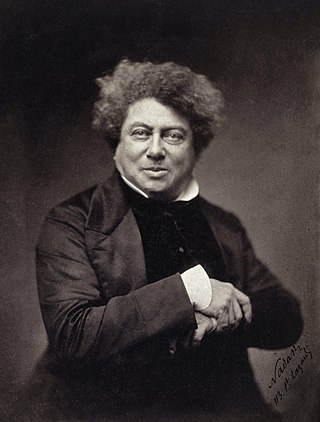
Charles Pierre Baudelaire was a French poet, essayist, translator and art critic. His poems are described as exhibiting mastery of rhyme and rhythm, containing an exoticism inherited from the Romantics, and are based on observations of real life.

The Rime of the Ancient Mariner, written by English poet Samuel Taylor Coleridge in 1797–98 and published in 1798 in the first edition of Lyrical Ballads, is a poem that recounts the experiences of a sailor who has returned from a long sea voyage. Some modern editions use a revised version printed in 1817 that featured a gloss.

Symbolism was a late 19th-century art movement of French and Belgian origin in poetry and other arts seeking to represent absolute truths symbolically through language and metaphorical images, mainly as a reaction against naturalism and realism.

Jean Nicolas Arthur Rimbaud was a French poet known for his transgressive and surreal themes and for his influence on modern literature and arts, prefiguring surrealism.

Alexandre Dumas, also known as Alexandre Dumas père, was a French novelist and playwright.

Les Fleurs du mal is a volume of French poetry by Charles Baudelaire.

Gérard de Nerval, the pen name of the French writer, poet, and translator Gérard Labrunie, was a French essayist, poet, translator, and travel writer. He was a major figure during the era of French romanticism, and best known for his novellas and poems, especially the collection Les Filles du feu, which included the novella Sylvie and the poem "El Desdichado". Through his translations, Nerval played a major role in introducing French readers to the works of German Romantic authors, including Klopstock, Schiller, Bürger and Goethe. His later work merged poetry and journalism in a fictional context and influenced Marcel Proust. His last novella, Aurélia ou le rêve et la vie, influenced André Breton and Surrealism.

Giuseppe Ungaretti was an Italian modernist poet, journalist, essayist, critic, academic, and recipient of the inaugural 1970 Neustadt International Prize for Literature. A leading representative of the experimental trend known as Ermetismo ("Hermeticism"), he was one of the most prominent contributors to 20th-century Italian literature. Influenced by symbolism, he was briefly aligned with futurism. Like many futurists, he took an irredentist position during World War I. Ungaretti debuted as a poet while fighting in the trenches, publishing one of his best-known pieces, L'allegria.
A libertine is a person questioning and challenging most moral principles, such as responsibility or sexual restraints, and will often declare these traits as unnecessary, undesirable or evil. A libertine is especially someone who ignores or even spurns accepted morals and forms of behaviour observed by the larger society. The values and practices of libertines are known collectively as libertinism or libertinage and are described as an extreme form of hedonism or liberalism. Libertines put value on physical pleasures, meaning those experienced through the senses. As a philosophy, libertinism gained new-found adherents in the 17th, 18th, and 19th centuries, particularly in France and Great Britain. Notable among these were John Wilmot, 2nd Earl of Rochester, and the Marquis de Sade.

Maxime Du Camp was a French writer and photographer.
Western literature, also known as European literature, is the literature written in the context of Western culture in the languages of Europe, and is shaped by the periods in which they were conceived, with each period containing prominent western authors, poets, and pieces of literature.
An albatross is one of a family of large winged seabirds.

The Decadent movement was a late 19th-century artistic and literary movement, centered in Western Europe, that followed an aesthetic ideology of excess and artificiality.

"Les Litanies de Satan" is a poem by Charles Baudelaire, published as part of Les Fleurs du mal. The date of composition is unknown, but there is no evidence that it was composed at a different time to the other poems of the volume.

Henri Cohen was a French music theorist, composer, and numismatist of Dutch birth.

Francesco Saverio Salfi or Franco Salfi was an Italian writer, politician and librettist.

The French filmmaker and magician Georges Méliès (1861–1938) is the subject of various written works, including biographies, essays, and monographs. The literature about him is abundant and spans many decades and languages, including English, French, Italian, Spanish, and German. Frank Kessler, a professor of media history, believes Méliès is arguably the most written about early filmmaker. Conversely, his name often appears in the titles of works not necessarily because his films are discussed but rather to signify the concept or time period of early cinema. Works in this bibliography have been reviewed in magazines or journals or are included in annotated bibliographies by Stéphane Tralongo or Elizabeth Ezra.

Ernest Louis Aquilas Christophe was a French sculptor, a student of François Rude and a friend of Charles Baudelaire. Rude assigned him to help with the bronze recumbent effigy to Éléonore-Louis Godefroi Cavaignac, a French politician. The funerary monument is signed Rude et Christophe, son jeune élève. His Le Masque sculpture won Christophe third place in the Paris Salon in 1876 and two of his sculptures, La Fatalité (Fatality) and Le Baiser suprême were acquired by the Musée du Luxembourg.

The Cinq poèmes de Charles Baudelaire constitute a song cycle for voice and piano by Claude Debussy, on poems taken from Les Fleurs du mal by Charles Baudelaire. Composed from December 1887 to March 1889, these five highly developed vocal pieces were not well received by Parisian musical circles because of the Wagnerian influence they revealed.

Eldorado is a volume of poetry by Dutch poet J. Slauerhoff. First published in 1928, the collection gathers poems that speak mostly of sailors' and pirates' lives and desires. The poems contain familiar themes for Slauerhoff: a sailor's life, the impossibility of life on land or in society, the myth of the pirate and the Flying Dutchman.

















